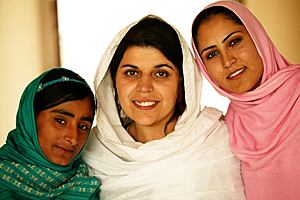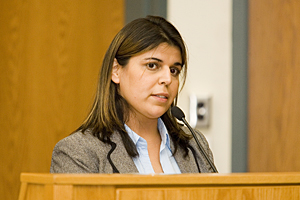

- Rozovsky wins prestigious NSF Early Career Award
- UD students meet alumni, experience 'closing bell' at NYSE
- Newark Police seek assistance in identifying suspects in robbery
- Rivlin says bipartisan budget action, stronger budget rules key to reversing debt
- Stink bugs shouldn't pose problem until late summer
- Gao to honor Placido Domingo in Washington performance
- Adopt-A-Highway project keeps Lewes road clean
- WVUD's Radiothon fundraiser runs April 1-10
- W.D. Snodgrass Symposium to honor Pulitzer winner
- New guide helps cancer patients manage symptoms
- UD in the News, March 25, 2011
- For the Record, March 25, 2011
- Public opinion expert discusses world views of U.S. in Global Agenda series
- Congressional delegation, dean laud Center for Community Research and Service program
- Center for Political Communication sets symposium on politics, entertainment
- Students work to raise funds, awareness of domestic violence
- Equestrian team wins regional championship in Western riding
- Markell, Harker stress importance of agriculture to Delaware's economy
- Carol A. Ammon MBA Case Competition winners announced
- Prof presents blood-clotting studies at Gordon Research Conference
- Sexual Assault Awareness Month events, programs announced
- Stay connected with Sea Grant, CEOE e-newsletter
- A message to UD regarding the tragedy in Japan
- More News >>
- March 31-May 14: REP stages Neil Simon's 'The Good Doctor'
- April 2: Newark plans annual 'wine and dine'
- April 5: Expert perspective on U.S. health care
- April 5: Comedian Ace Guillen to visit Scrounge
- April 6, May 4: School of Nursing sponsors research lecture series
- April 6-May 4: Confucius Institute presents Chinese Film Series on Wednesdays
- April 6: IPCC's Pachauri to discuss sustainable development in DENIN Dialogue Series
- April 7: 'WVUDstock' radiothon concert announced
- April 8: English Language Institute presents 'Arts in Translation'
- April 9: Green and Healthy Living Expo planned at The Bob
- April 9: Center for Political Communication to host Onion editor
- April 10: Alumni Easter Egg-stravaganza planned
- April 11: CDS session to focus on visual assistive technologies
- April 12: T.J. Stiles to speak at UDLA annual dinner
- April 15, 16: Annual UD push lawnmower tune-up scheduled
- April 15, 16: Master Players series presents iMusic 4, China Magpie
- April 15, 16: Delaware Symphony, UD chorus to perform Mahler work
- April 18: Former NFL Coach Bill Cowher featured in UD Speaks
- April 21-24: Sesame Street Live brings Elmo and friends to The Bob
- April 30: Save the date for Ag Day 2011 at UD
- April 30: Symposium to consider 'Frontiers at the Chemistry-Biology Interface'
- April 30-May 1: Relay for Life set at Delaware Field House
- May 4: Delaware Membrane Protein Symposium announced
- May 5: Northwestern University's Leon Keer to deliver Kerr lecture
- May 7: Women's volleyball team to host second annual Spring Fling
- Through May 3: SPPA announces speakers for 10th annual lecture series
- Through May 4: Global Agenda sees U.S. through others' eyes; World Bank president to speak
- Through May 4: 'Research on Race, Ethnicity, Culture' topic of series
- Through May 9: Black American Studies announces lecture series
- Through May 11: 'Challenges in Jewish Culture' lecture series announced
- Through May 11: Area Studies research featured in speaker series
- Through June 5: 'Andy Warhol: Behind the Camera' on view in Old College Gallery
- Through July 15: 'Bodyscapes' on view at Mechanical Hall Gallery
- More What's Happening >>
- UD calendar >>
- Middle States evaluation team on campus April 5
- Phipps named HR Liaison of the Quarter
- Senior wins iPad for participating in assessment study
- April 19: Procurement Services schedules information sessions
- UD Bookstore announces spring break hours
- HealthyU Wellness Program encourages employees to 'Step into Spring'
- April 8-29: Faculty roundtable series considers student engagement
- GRE is changing; learn more at April 15 info session
- April 30: UD Evening with Blue Rocks set for employees
- Morris Library to be open 24/7 during final exams
- More Campus FYI >>
1:26 p.m., Aug. 14, 2008----Awista Ayub believes that one person can make a positive difference in the lives of other.
That's why the Afghan native, who is working on a graduate degree in the College of Human Services, Education and Public Policy, founded the Afghan Youth Sports Exchange in 2003. The organization is dedicated to preparing Afghanistan youth with the leadership skills needed to successfully promote athletics in their native schools and communities.
Ayub followed this effort by sponsoring eight young female leaders to the United States as the first international girl's soccer team from Kabul. In 2006 and 2007 she traveled to Kabul with four Afghan-American soccer coaches to organize a soccer clinic for girls in Kabul. The clinic worked through the Afghanistan National Olympic Committee and the Afghanistan Football Federation.
“I grew up in America in the era of Title IX, and soccer seemed the most natural sport to take to Afghanistan. I also thought that because it was an internationally known sport that everybody played, there would not be a bias against girls playing the sport,” Ayub said. “Not knowing exactly what I was doing, I still managed to get the sport started for girls in Afghanistan. Doing this changed the direction of my life.”
While her efforts have been recognized with honors such as the Arthur Ashe Courage Award, which she received at the 2006 ESPY Awards, Ayub said she feels that the first group of girl soccer players from Afghanistan and those who have followed in their footsteps have benefited the most.
“The sport was not played by girls in any of the communities where they lived. These girls turned out to be some of the best ambassadors for the sport, and it has enabled them to be pioneers of the sport,” Ayub said. “It was a wonderful series of events. You see that you can make a difference, and you just try to play a small part in making that difference.”
Ayub said that it did not take long before the soccer prowess of the original group of girls surpassed her own soccer skills.
“I tell all of them how proud I am of them. They are amazing soccer players. None of them ever played soccer before,” Ayub said. “Now, it is really amazing to see them play today, especially the ones who played on the Afghanistan National Women's team in Kabul.”
Although competition in sports has its rewards for both the players and the larger community, Ayub said seeing the young people get a good education should be the primary goal of any such initiative in Afghanistan and in many countries around the world.
“Although they are amazing soccer players, we stress education,” Ayub said. “This is more important than anything else.”
At the last count, there are some 15 girls soccer teams in Afghanistan, including the national team, Ayub said.
“The media in Afghanistan really focus on local sports,” Ayub said. “This allows girls to see that others like themselves can play the game. As a result, there is a peer-to-peer connection.”
In continuing her own education, Ayub is currently pursuing a master's degree in UD's School of Urban Affairs and Public Policy. She also writing a book about the first girl's soccer team she brought to America and the impact that soccer has had on her life.
“The working title is 'The Kabul Girl's Club,'" Ayub said. “The book is about my life, coming here as an immigrant and the impact that soccer has had on the members of that original group of girls from Afghanistan.”
Writing a book while keeping up with her academic responsibilities took some getting used to, Ayub said.
“I'm the kind of person who has to be going 100 miles per hour all the time,” Ayub said. “It took me about a month to settle down and work on the book, as well as my studies.”
While writing a book about her experiences is both challenging and fun, Ayub said she also has learned that writing is hard work.
“I am working with a writer, and it's turning out to be a wonderful experience,” Ayub said. “Still, it's hard work, remembering all those little things you have to do.”
Having come to America as a two-year old with parents fleeing a country torn by war, Ayub said that the examples set by her mother and father have taught her that hard work and honesty are among the things that matter the most.
“They are my rock and my inspiration,” Ayub said. “I have appreciated everything they have done. They are very big on education, and they taught me that if you do all of the things you should, that effort will pay off.”
As for the future, Ayub sad she is always open to new opportunities, and hopes to continue the work she began in introducing that first group of girls to the possibilities that begin with athletics as a part of a lifelong journey of personal fulfillment.
“My life could have been very different. Now, it is about giving back and helping others,” Ayub said. “In sharing that vision and hope, I look to these girls all the time.”
Article by Jerry Rhodes


